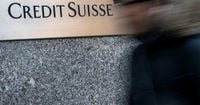UBS Group AG has agreed to pay a significant $511 million to settle a U.S. investigation into its acquisition of Credit Suisse Group, primarily focusing on how the Swiss bank facilitated tax evasion for wealthy Americans. This settlement, announced on May 5, 2025, marks a critical juncture in a long-standing scandal that has plagued Credit Suisse, which had previously pledged to cease such practices.
The investigation revealed that a unit of Credit Suisse, known as Credit Suisse Services AG, pleaded guilty to conspiring to help its clients hide over $4 billion from the U.S. Internal Revenue Service (IRS) through at least 475 offshore accounts. This guilty plea underscores the bank's failure to uphold its commitments made in a 2014 agreement with U.S. authorities.
According to the U.S. Department of Justice, the wrongdoing involved maintaining accounts in Singapore for U.S. taxpayers who were using these offshore accounts to evade taxes and reporting requirements. The Justice Department noted that Credit Suisse bankers engaged in fraudulent activities, including falsifying records and processing fictitious donation paperwork, which enabled them to service more than $1 billion in accounts without proper documentation of tax compliance.
In 2014, Credit Suisse made headlines by becoming the largest bank in two decades to plead guilty to a U.S. criminal charge, agreeing to pay a hefty $2.5 billion fine for its role in helping Americans evade taxes. However, the recent findings indicate that the bank continued to assist clients in tax evasion, violating the terms of its 2014 plea deal. A 2023 report from the U.S. Senate Finance Committee highlighted that Credit Suisse concealed more than $700 million from the government, further compounding its legal troubles.
UBS, which acquired Credit Suisse in 2023, stated that it was not involved in the underlying misconduct that occurred before the acquisition. The bank emphasized its commitment to compliance, stating that it has a "zero tolerance for tax evasion." UBS expects to recognize a credit related to the contingent liability set up during the acquisition and anticipates recording a charge in the second quarter of 2025 as a result of this settlement.
The Department of Justice's announcement also included a criminal charge associated with U.S. accounts booked at Credit Suisse AG Singapore, which could be dropped if the bank cooperates sufficiently with ongoing investigations.
The scandal surrounding Credit Suisse has drawn significant scrutiny, particularly regarding its long history of facilitating tax evasion. Court documents revealed that Credit Suisse unlawfully helped clients hide assets, including those of a billionaire scion of a wealthy European family. Despite having clear evidence of the client's U.S. residency, the bank failed to close the account or report it to the IRS, highlighting a blatant disregard for tax compliance.
In addition to the high-profile cases, the investigation also detailed how Credit Suisse enabled tax evasion by individuals such as Dan Horsky, an American business professor who pleaded guilty in 2016 to hiding more than $200 million in assets from the IRS. Similarly, Gilda Rosenberg, a family member of a U.S.-Colombian family, pleaded guilty in March 2025 to conspiring with relatives to hide $90 million from the IRS between 2010 and 2017.
Jeffrey Neiman, an attorney representing whistleblowers who exposed this ongoing misconduct, expressed satisfaction with the outcome. He stated, "Today, they feel vindicated—for telling the truth, for risking everything, and for standing up to one of the world’s most powerful financial institutions." This sentiment reflects a broader call for accountability in the financial sector, particularly concerning tax compliance.
UBS's legal challenges are compounded by its historical connections to various compliance issues. The bank recently received a five-year extension from the U.S. Labor Department regarding its status as a Qualified Professional Asset Manager, despite previous convictions for misconduct. This extension was granted as part of the department's recognition of the need for stringent oversight, given the "scope, seriousness, and recurrent nature of UBS’ prohibited misconduct."
Furthermore, UBS reinstated Neil Barofsky as an independent ombudsman to oversee its review of accounts linked to the Nazi regime, a move that has been met with mixed reactions. Senators Chuck Grassley and Sheldon Whitehouse emphasized the importance of a thorough evaluation of Credit Suisse's handling of these accounts, underscoring the need for transparency and accountability.
As UBS navigates this complex landscape, it faces the dual challenge of managing its reputation while adhering to strict regulatory requirements. The settlement with the U.S. government not only addresses past misconduct but also sets a precedent for future compliance in the financial industry. The pressure for banks to maintain ethical practices and uphold their commitments to regulatory bodies has never been greater, especially in light of the ongoing scrutiny over tax evasion and financial misconduct.
In conclusion, the $511 million settlement serves as a stark reminder of the consequences faced by financial institutions that fail to adhere to legal and ethical standards. As UBS moves forward, it must prioritize compliance and transparency to restore trust among its clients and regulators alike.

